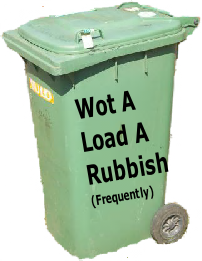


Copyright © 2010, ‘Our Exeter’, all rights reserved.

Cleansing - Increasingly a misnomer! Poor service provision and continuing failures to address the squalor and filth on our streets. The ‘Our Exeter’ team have endeavoured to resolve a variety of cleansing issues for years and only experienced deteriorating standards.
‘Our Exeter’ are currently exploring why Cleansing aren’t actually cleansing. Clearly, taking a broom for a ride around the streets of our communities must be for the benefit of the broom, the streets and gutters certainly aren’t seeing any benefit from this exercise.
Community representative currently awaiting reply from Exeter City Council in response to 5 page document highlighting their failings and if or how they intend to resolve them. We will publish their comments as soon as they are available.
Send your comments here
Latest - ECC’s response received and pertinent points will be added soon.
For Information -
Following the introduction of unwanted fortnightly rubbish collections there have been many problems relating to storage of waste. Additional black bins can be requested from Cleansing but will only be issued to properties with 6 occupants or more. Given that the vast majority of properties in our community do not fulfil ECC’s required occupancy level (although many have 4/5 occupants), and produce far more rubbish than can be hygienically stored for up to two weeks, precisely how do ECC intend to rectify this situation? ‘Our Exeter’ understand the need to increase levels of recycling but would like to inform them that their current system is failing in every way.
_________________________________________
16th January, 2011
Ministers tried to cover up a Government-funded report which linked fortnightly rubbish collections with an increased health risk from rats, flies and seagulls.
The World Health Organisation has called for weekly rubbish collections to protect public health.
The report found that ending weekly collections would "significantly alter the pest infestation rates and hence the disease transmission at source", while vermin and insects could be "encouraged into the home environment".
However, the Government kept the £27,000 study, by the Central Science Laboratory, under wraps and ministers were only forced to release it when the Conservatives tabled a series of parliamentary questions.
In June 2007, Ben Bradshaw, then an environment minister, claimed there was "no evidence in published studies" to indicate a link between cutting collections and increased risks to health.
Eric Pickles, the shadow local government minister, said last night: "Ministers have been caught red-handed trying to hide worrying research from the Government's own scientists. There is a clear health risk from cuts to weekly rubbish collections, as will become apparent in the summer as temperatures increase.
"Under Gordon Brown, local residents are paying exorbitant levels of council tax but are failing to get decent public services in return.
"People genuinely want to improve recycling and go green, but Labour's approach of forcing rubbish cuts is not the answer, as it will harm the local environment and public health."
Separate government figures show that 169 councils out of 350 across England have now ended weekly bin collections – up from 140 councils in April last year.
Official guidance from the government quango, Wrap, has told town halls how to get rid of weekly collections and overcome "public resistance". It advised the cuts should be done after local elections to stop people voting against them, and in the autumn or winter so that residents would not immediately notice the extra smells and vermin.
This is despite the fact that the World Health Organisation has called for weekly rubbish collections to protect public health. The report is understood to have been commissioned by ministers in 2005 and completed in 2006.

